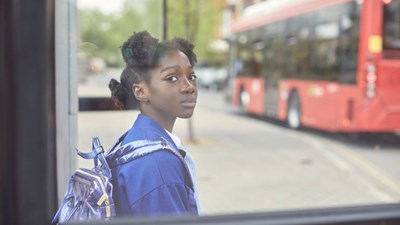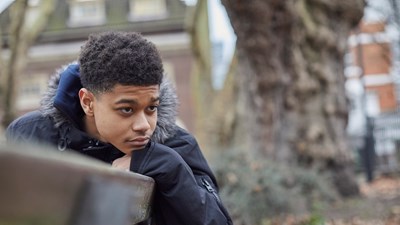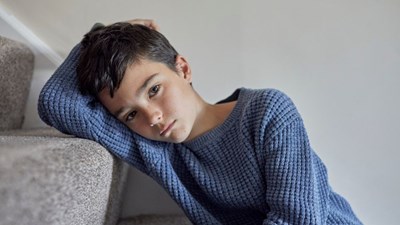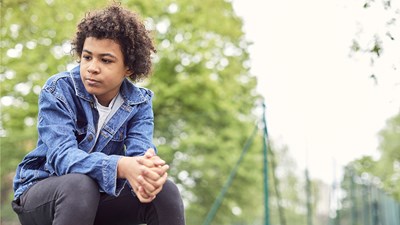Children and young people involved with gangs and criminal exploitation need help and support. They might be victims of violence or pressured into doing things like stealing or carrying drugs or weapons. They might be abused, exploited and put into dangerous situations.
We have advice about what to do if a child is being groomed to join or has already joined a gang.
Worried about a child?
Contact our Helpline by calling 0808 800 5000 or emailing help@NSPCC.org.uk.
What is criminal exploitation?
Criminal exploitation is child abuse where children and young people are manipulated and coerced into committing crimes.
What is a gang?
The word ‘gang’ means different things in different contexts, the government in their paper ‘Safeguarding children and young people who may be affected by gang activity’ distinguishes between peer groups, street gangs and organised criminal gangs.1
- Peer group
A relatively small and transient social grouping which may or may not describe themselves as a gang depending on the context. - Street gang
“Groups of young people who see themselves (and are seen by others) as a discernible group for whom crime and violence is integral to the group's identity.” - Organised criminal gangs
“A group of individuals for whom involvement in crime is for personal gain (financial or otherwise). For most crime is their 'occupation.”
It's not illegal for a young person to be in a gang – there are different types of ‘gang’ and not every ‘gang’ is criminal or dangerous. However, gang membership can be linked to illegal activity, particularly organised criminal gangs involved in trafficking, drug dealing and violent crime.
What is County Lines?
County Lines is the police term for urban gangs exploiting young people into moving drugs from a hub, normally a large city, into other markets - suburban areas and market and coastal towns - using dedicated mobile phone lines or “deal lines”. Children as young as 12 years old have been exploited into carrying drugs for gangs. This can involve children being trafficked away from their home area, staying in accommodation and selling and manufacturing drugs. This can include:
- Airbnb and short term private rental properties
- budget hotels
- the home of a drug user, or other vulnerable person, that is taken over by a criminal gang- this may be referred to as cuckooing.
Signs that cuckooing has taken place include:
- signs of drugs use
- more people coming and going from the property
- more cars or bikes outside
- litter outside
- you haven’t seen the person who lives there recently or when you have, they’ve seemed anxious, distracted or not themselves.
Children living in these properties are at risk of neglect and other types of abuse. If you’re worried, it’s important to contact the Police or our helpline immediately.
If a child has been trafficked for the purpose of criminal exploitation then they are a victim of abuse. Find out more about child trafficking and what support is available.
How are young people recruited?
A child or young person might be recruited into a gang because of where they live or because of who their family is. They might join because they don’t see another option or because they feel like they need protection. Children and young people may become involved in gangs for many reasons, including:
- peer pressure and wanting to fit in with their friends
- they feel respected and important
- they want to feel protected from other gangs, or bullies
- they want to make money, and are promised rewards
- they want to gain status, and feel powerful
- they’ve been excluded from school and don’t feel they have a future
Organised criminal gangs groom children and young people because they’re less suspicious and are given lighter sentences than adults.
Studies show that a child is more at risk of being recruited if:
- they’ve been excluded from school
- they have special education needs
- there are problems at home like neglect, domestic abuse or sexual abuse
- they have problems with their mental health
- they live in existing gang territory
If you’re worried a child or young person is being groomed for criminal exploitation or to join a gang, contact our helpline immediately. Our trained counsellors can signpost you to local services and provide professional advice.
Signs of criminal exploitation
There are some signs to look out for if you’re worried a child or young person has joined a gang, or is being criminally exploited. It might be hard to spot at first, but the sooner you’re able to talk to the young person the more you’ll be able to help them.
- Frequently absent from and doing badly in school.
- Going missing from home, staying out late and travelling for unexplained reasons.
- In a relationship or hanging out with someone older than them.
- Being angry, aggressive or violent.
- Being isolated or withdrawn.
- Having unexplained money and buying new things.
- Wearing clothes or accessories in gang colours or getting tattoos.
- Using new slang words.
- Spending more time on social media and being secretive about time online.
- Making more calls or sending more texts, possibly on a new phone or phones.
- Self-harming and feeling emotionally unwell.
- Taking drugs and abusing alcohol.
- Committing petty crimes like shop lifting or vandalism.
- Unexplained injuries and refusing to seek medical help.
- Carrying weapons or having a dangerous breed of dog.
Dangers of criminal exploitation
It’s important to be aware of the risks of criminal exploitation or being involved with a criminal gang. They can use different tactics to recruit and exploit children and young people, including bribing them with rewards, befriending them, and threatening them, or coercing them.
Dangers of criminal exploitation include:
- being subject to threats, blackmail and violence
- being exploited and forced to commit crimes
- being arrested, including for crimes committed by the gang that they have not directly committed under the law of joint enterprise
- not being able to leave or cut off ties with the gang
- having their safety or the safety of friends and family threatened
- risk of physical harm, rape and sexual abuse
- risk of emotional abuse
- risk of severe injury or being killed
- abusing drugs, alcohol and other substances
- long term impact on education and employment options.
Exploiting a child into committing crimes in abusive. Children who are targeted can also be groomed, physically abused, emotionally abused, sexually exploited or trafficked. However, as children involved in gangs often commit crimes themselves, sometimes they aren’t seen as victims by adults and professionals, despite the harm they have experienced. It’s important to spot the signs and act quickly if you think a child is being groomed or is becoming involved with a gang. Read more about the signs below.
Read more about what to do below if you’re worried a child or young person is in a gang or being exploited. Childline has advice for young people who are in a gang or worried about a friend.
Worried about a child?
You can contact the NSPCC Helpline by calling 0808 800 5000, emailing help@NSPCC.org.uk or completing our report abuse online form.
Carrying weapons
It’s against the law to carry a weapon – like knives, guns or acid – even if it’s meant for protection. If someone is found with a weapon they’ll be arrested. The safest thing to do if there’s a threat is to contact the police, not to carry weapons for self-defence.
If you’re concerned about a child’s safety, contact the police immediately or contact our helpline for advice.
What to do if you're worried
There are things you can do to help stop a child from getting involved in a gang, or to help them once they've joined.
If a child or young person is being groomed to join a gang, there are many factors to consider to protect them and keep them safe. However, it’s crucial that they feel they’re able to talk to you, or to another trusted adult outside of the gang.
Speak to them honestly about the consequences of violent or illegal behaviour – they might not realise how they could be liable or could have been lied to. However, make sure that they still feel comfortable talking to you about what is worrying them.
If you’re worried about a child, or know that they’re involved with a gang or criminal group, try to be aware where they are when they’re out, who they’re with and what they’re doing on social media. It’s important they trust you, but they might also be at risk.
Get to know your child’s friends and their families, and work with other parents and schools to keep an eye on their behaviour and who they’re with. This will help to know when they might need support or when they might be at risk.
If you’re concerned about your child, the sooner you reach out to the Police or other agencies the better.
You can:
- contact our helpline to speak to trained professionals about what is happening, who can take action and who can signpost you to the right services and support agencies in your area
- contact the police immediately if you’re worried the child is in danger
- contact Children’s Services – you can find them through your local council
- talk to the safeguarding lead at the child’s school and ask for support.
You can encourage them to get involved in positive activities at school or outside your local area – such as sports and clubs. You can also talk to them about what they want to do in the future, and find apprenticeships and school programmes to help. It’s important they feel like they have other options.
Talk to them about how to cope with pressure and how to deal with conflicts without using violence. Try to teach by example and look for ways of disciplining a child that don’t involve violence, so they feel like they can still talk to you about what’s happening.
More support for you and your child
References
-
Adapted in the Children Commisioner's Report (February 2019) 'Keeping Children Safe: Improving safeguarding responses to gang violence and criminal exploitation' from Hallsworth S and Young T (2004) Getting Real About Gangs. Criminal Justice Matters (55) 12-13






